
Corruption
Written by: Rik
Date posted: December 30, 2013
- Genre: Adventure
- Developed by: Magnetic Scrolls
- Published by: Rainbird
- Year released: 1988
- Our score: 4
Text adventures formed a significant part of my early gaming life, and some of my earliest memories involve trying to play a game called Colossal Adventure on the Amstrad CPC. I was never able to establish whether the adventure was indeed colossal, though, because as a 7-year-old boy I had neither the wit or staying power to do anything other than explore for a bit and then give up when I got stuck or bored. As such, I don’t look back on the genre with much residual affection, particularly as games generally seemed to involve a fantasy world of beards, axes and dragons, in which I had as little interest then as I do now.
With its contemporary setting, Corruption always stood out as offering something a little different (although it was not, as I had thought for years, developed by Level 9 of Colossal Adventure fame – I think my conflation of the two developers had something to do with publisher Rainbird’s distinctive blue packaging). However, as a young boy, my interest had more to do with spying a screenshot involving a BMW dashboard and extrapolating that into fully-realised driving sequences than anything else, and once I started playing and found that it was the same text-based, rock hard, ‘go north’ stuff that I didn’t really care for, I quickly left it alone again.
As an adult better-equipped to make progress and comprehend the cut-throat 80s corporate shenanigans within (in many ways it’s probably just as well I never got that far as a kid, given some of the content), though, it seemed like a good one to return to. Even now, with themes of greed, gross mismanagement and, well, corruption within financial institutions as relevant as ever, you rarely see such topics being used as the basis for a game, particularly one that involves good old-fashioned thinking as the main method of extricating yourself from the ensuing mess.
As Derek Rogers, a stockbroker [*fist-pump* YESS!! – a reader], you begin the game having just accepted a partnership at your firm. However, while all seems well on the surface, something dodgy is going on behind the scenes. It may only be your first day, but if you choose to spend your time admiring your new office rather than following up on your suspicions, chances are you could find yourself in some serious bother.
Innovation in Corruption isn’t limited to the setting, and it eschews the traditional themes of exploration, inventory manipulation and puzzle solving in favour of gathering information and being in a position to do the right thing at the right time. The clock is ticking throughout: each move takes one minute of game time, and at various points in the day certain events occur – non-player characters moving, or performing actions – that ultimately have a (sometimes terminal) effect on your progress. Often, you have a certain amount of time to pick up an object before another character does so, or you may need to be in a certain location to witness an event or overhear a conversation.
You certainly don’t have a lot of time to waste. In the words of Ron Burgundy, things really get out of hand fast, and, one way or another, your partnership at Rogers and Rogers isn’t going to last more than a day. Mindless pratting around will usually be costly, and time-wasting can often be inadvertent. Each and every action ticks the time forward, even the really basic stuff you might need to orient yourself such as ‘look’ and ‘exits’ (handy hint: set the descriptive text to ‘verbose’ in order to get a full description of each room as you enter, otherwise the game will only give you one on your first visit). Elsewhere, it’s worth noting that ‘examine’ and ‘read’ don’t do the same thing (and the latter is pretty important), and when you interact with other characters you either need to ‘ask’ or ‘tell’ them about something in particular. At some points in the game your window of opportunity is so short that you need to remember to use commas to ‘pick up’ multiple items in the same move rather than doing so one-by-one (‘get all’ does work, but you often don’t need – or want – ‘all’).
You might surmise that this makes things rather difficult in places, and you’d be right. The difficulty is compounded by the proactive approach you need to take in order to get anywhere. Text adventures are variously referred to as ‘interactive fiction’, a phrase which conjures up memories of those old Fighting Fantasy choose-your-adventure type fare (‘if you want to cast a spell, turn to page 65; if you want to talk to the dragon, turn to page 100’). Although in practice they rarely work in this way, it’s noticeable that Corruption doesn’t often present you with an obvious situation or problem to solve, and instead you really have to go looking for trouble almost immediately if you’re going to get anywhere, otherwise all you’ll get are vague hints that something’s up, and then it’s game over. Without giving too much away, it’s best to assume an extremely suspicious mindset from the very start.
Even so, it will take some time to piece things together, and your quest can be ended early for any of a number of reasons. Suffering a quick death, such as doing something stupid or simply being a victim of the game’s more dangerous points, can be annoying, but it’s nothing compared to the familiar and hated adventure game pitfall of having failed to do something crucial in the early stages that only becomes apparent many hours (and saves) later.
Like many games of the era, Corruption is pretty difficult. In the pre-internet-walkthrough days, I wouldn’t have finished it in a million years. Now, given my lack of experience with the genre, I’m perhaps not the best-placed to judge, but to me it seems that some of this game’s interface quirks could probably have been removed and it would still be difficult enough. On the default setting, you don’t even get a description of the room you’re in after re-loading a save, which seems to take the necessity for note-taking while playing to rather extreme levels.
For those of a wimpier disposition, it’s probably worth noting that Corruption was later re-released as part of The Magnetic Scrolls Collection, which uses a graphical interface known as ‘Magnetic Windows’, first used in a later game called Wonderland. If you want to dodge some of the idiosyncrasies of the original, then this is probably the version to check out; although the content remains pretty much the same, the interface gives you access to a map, an inventory and details of the objects in the room without you having to use up any time.
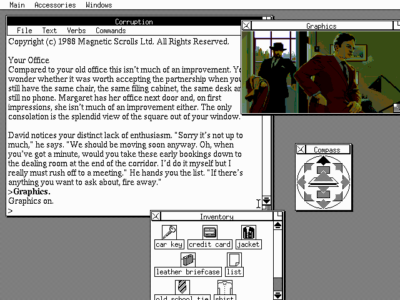
Magnetic Scrolls Collection: For some reason your character feels the need to comment on the attractiveness of the secretarial staff.
On the positive side, it’s rather fun to unpick the mysteries at the heart of the game, particularly in the early stages when you’re snooping around your offices looking for evidence. Although it’s tough, as you play and re-play, you’ll figure out what you need and how you need to get it. There are some nice touches, such as the ‘follow’ command, so you can tail another character and see where they go and what they do. At other times, you may need to simply note characters’ movements and take the opportunity to make the most of their absence. The tension is palpable when you’re somewhere you shouldn’t be, rifling through someone’s desk drawer, although in my experience there aren’t many ‘caught red-handed’ moments – the other characters’ presence acts as an obstacle to avoid more than anything else.
And, although the parser has some issues (having to refer to your car as ‘BMW’ but not recognising ‘BMW key’, only ‘car key’ was a particular bugbear of mine) there are some times when it really works rather nicely in an unexpected way. One of my favourite moments was when another character arrived at my location one minute after I found out he’d [redacted to avoid spoilers] so, on a whim, I typed ‘punch David’ and it had the desired effect, describing a satisfying thump and the ensuing brawl (and, obviously, the ‘game over’ aftermath). Also, at the time of release, one of the key plot points was revealed via an audio cassette that came with the game, which is another nice touch – even if these days you have to grab an MP3 of the recording instead. I can’t say too much more without spoiling things – but it’s quite cleverly done.
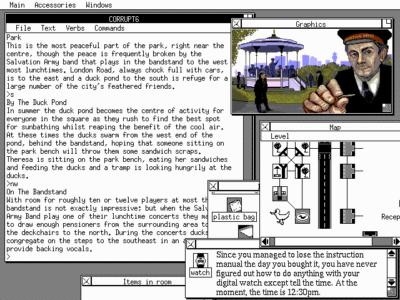
Magnetic Scrolls Collection: In this version the time is only displayed when you look at your watch.
Still, although Corruption is a difficult game, it occupies a fairly small world and the tale it tells isn’t massively complex. Longevity comes from its difficulty, which is fair enough, although there are some truly baffling moments, such as the hospital section, which left me questioning how anyone ever worked it out in the first place. The frayed nerves and paranoia of those who have are evident in online walkthroughs that advise that YOU MUST or MUST NOT do something in a particular order, which wasn’t always the case – although I’m not knocking the efforts of these hardy souls, without whom I would never have made it through.
While Corruption certainly has some admirable qualities, offering an original setting and approach, as well as an impressive level of investigative freedom, I can’t say that I can recommend it, particularly for anyone unfamiliar with the demands of the genre who isn’t driven by some level of nostalgia for a game once owned but never completed.

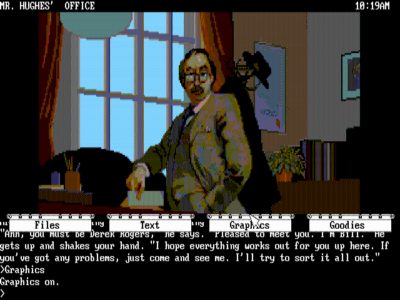
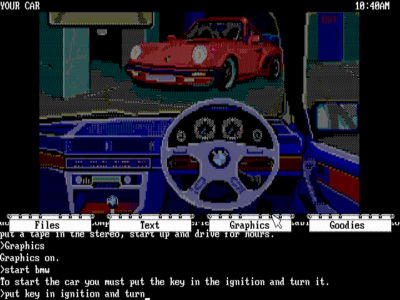
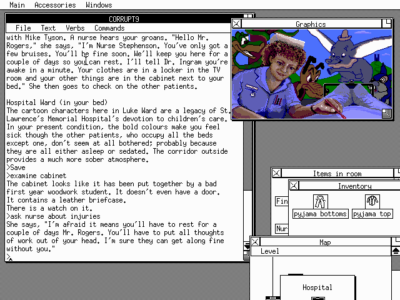

 Posts
Posts
I never liked this new interface. Somehow seemed backwards to establish something like ICOM had used in their early games when they had just moved away from it. This sort of freely arrangeable windows thing just breaks immersion, though I, too, usually turned off the graphics in the classic versions of the Magnetic Scrolls games in order to see more text.
January 2, 2014 @ 9:50 pm
Wonderland was early 90s which seems a little late to be introducing an interface like this and hailing it as something new and exciting.
I thought I’d better mention the MSC version though seeing as it made some of the things I found difficult a little easier.
Whether I should have found those things difficult is of course open to debate! The manual specifically mentions the importance of map-making and note-taking, as well as the need to use your moves carefully, and I guess the MSC version waters that side of things down a little.
And yes, it’s probably not as immersive – although perhaps I didn’t notice as I’d already played through the original version before I gave it a try, by which point I was more interested in the technicalities of what was different instead of getting involved in the adventure and finding things out for the first time.
January 3, 2014 @ 10:10 am